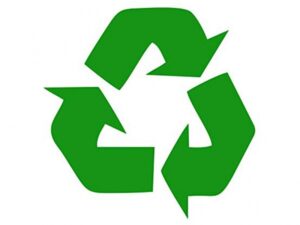While I am a recycling nut, my husband swears it all ends up in a landfill. And, we aren’t the only two debating this. With a push to improve the health of Red Stick, recycling has been a hot topic in many circles. Some parents recycle to try and help make a difference in our community, but there are ways that recycling can be done incorrectly, causing the recyclable items to only end up where my husband predicted–in a landfill, completely erasing the work that was done.
Local mom Nancy Mahalik shares that she and her children recycle. “Recycling is a commitment to my kids, and ultimately, my grandkids. I saw a statistic one time about cardboard toilet paper rolls and the length one family adds to a local dump each year. I started recycling years ago with that statistic in my mind, and I appreciate communities that have a committed focus on recycling.”
On the flip side, parents who do not recycle often say that they don’t because their neighborhood or workplace doesn’t have a recycling pickup or they lack faith that the items they are recycling are actually being recycled and not just taking a different route to the city dump.
Sadly, they aren’t completely wrong, which is where the problem lies. However, with the right education, there are ways that we can help get the recyclables to the right place. “I think recycling education is needed so people will care more and do more about it,” adds Lindsay Harper.
The Bottom Line in Baton Rouge
According to The Red Stick Green Guide, Baton Rouge recyclables are trucked to Progressive Waste Solutions. “There, materials are separated, baled, and shipped off to be processed into new recycled products,” reports the guide.
Lisa Mahoney with City of Baton Rouge Recycling shares that after the recyclables are sorted and baled, they are sold. Pratt Industries buys Baton Rouge’s cardboard and paper, and plastics, steel, and tiny, are sent to regional manufacturers for processing.
In 2016, Baton Rougeans threw nearly 42,000 tons of garbage into landfills, and we recycled about 14,000 tons. Overall, Louisiana currently recycles about 6.3 percent of our waste, according to the Department of Environmental Quality’s 2016 annual report. Household trash is comprised of 35 percent paper, and nearly ⅓ of U.S. waste is packaging. Only one percent of 30 billion plastic bags used in the U.S. annually are recycled.
The Problem with Recycling
We are are the problem with recycling! Many of us, despite our best intentions, are recycling incorrectly.
Baton Rouge has a single-stream recycling program. This means that all of our recyclables that we have collected are placed in a single bin.
Recycling contamination is anything that does not belong in the bin from non-recyclable items and food leftovers to plastic bags. One bit of contamination can ruin an entire bin of potential recyclables, resulting in sending them to the landfill. Mahoney shares that the most frequent contaminant in Baton Rouge recycling is plastic bags.
“I don’t want to give the impression that plastic bags are not recyclable, they are, but not in curbside pickup. People often collect their recyclables in plastic bags and throw the bag into the bin. This can lead to a lot of recyclable materials being thrown away. The plastic bags are bad for the automated recycling system because they get caught in the screens. This causes the screens to malfunction, and it increases downtime because the screens have to be cut free of the plastic film. You can recycle plastic bags, ice bags, plastic film, and dry cleaning bags at the pickup boxes located in grocery stores.” Mahoney explains.
If you’re in doubt, throw it out. This will prevent loads of perfectly good recyclables from being trashed because they’ve been mixed in with the contaminating item.
Get the Kids Involved
Local teacher Ann Giles shares that her class saves toilet paper rolls, milk jug tops, and other pieces to use in their art center. Teresa McDempsy, a gardening teacher, says that her students find innovative ways to reuse materials within their school garden.
You can also remind kids to turn off the water when brushing their teeth and turn off lights when leaving a room. Also, use reusable water bottles, pack lunches in reusable packaging, reuse paper, compost, donate items to local resale shops, use fabric shopping bags, and learn to differentiate garbage from recyclable items.
I’ve made recycling easier in our household by having two different colors of trash can: one for garbage and one for the recycling bin.■





